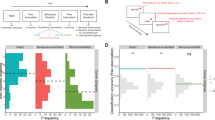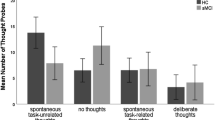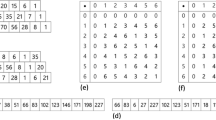Abstract
MANY people who gain high scores on conventional IQ tests are less successful on open ended tests that require mental fluency and imaginativeness1–4. Such individuals have been called convergers, and those with the opposite bias, divergers3; convergers are more likely to specialize in the physical sciences, divergers in the arts3,5. Open ended tests are themselves widely assumed to measure creativity, but the association with arts or science specialization suggests that this is an oversimplification.
This is a preview of subscription content, access via your institution
Access options
Subscribe to this journal
Receive 51 print issues and online access
$199.00 per year
only $3.90 per issue
Buy this article
- Purchase on Springer Link
- Instant access to full article PDF
Prices may be subject to local taxes which are calculated during checkout
Similar content being viewed by others
References
Getzels, J. W., and Jackson, P. W., Creativity and Intelligence (Wiley, New York, 1962).
Wallach, M. A., and Kogan, N., Modes of Thinking in Young Children (Holt, Rinehart and Winston, New York, 1965).
Hudson, L., Contrary Imaginations (Methuen, London, 1966).
Cropley, A., and Maslany, G., Brit. J. Psychol., 60, 395 (1969).
Povey, R. M., Brit. J. Psychol., 61, 55 (1970).
Rechtschaffen, A., and Verdone, P., Percep. Motor Skills, 19, 947 (1964).
Aserinsky, E., and Kleitman, N., Science, 118, 273 (1953).
Molinari, S., and Foulkes, D., Percep. Motor Skills, 29, 343 (1969).
Dement, W. C., in New Directions in Psychology II (edit. by Edwards, W., Lindmann, H., and Phillips, L.) (Holt, Rinehart and Winston, New York, 1965).
Hall, C., and Van de Castle, R. L., The Content Analysis of Dreams (Meredith, New York, 1964).
Dement, W. C., and Wolpert, E. A., J. Exp. Psychol., 55, 543 (1958).
Berger, R. J., and Oswald, I., Science, 137, 601 (1962).
Lewis, H. B., Goodenough, D. R., Shapiro, A., and Sleser, I., J. Abnorm. Psychol., 71, 52 (1966).
Antrobus, J. S., Dement, W. C., and Fisher, C., J. Abnorm. Soc. Psychol., 69, 341 (1964).
Hadamard, J., The Psychology of Invention in the Mathematical Field (Dover, New York, 1954).
Freud, S., The Interpretation of Dreams (Hogarth Press, London, 1953).
Author information
Authors and Affiliations
Rights and permissions
About this article
Cite this article
AUSTIN, M. Dream Recall and the Bias of Intellectual Ability. Nature 231, 59–60 (1971). https://doi.org/10.1038/231059a0
Received:
Issue Date:
DOI: https://doi.org/10.1038/231059a0
This article is cited by
-
Sleep dreams, cerebral dominance and creation
The Pavlovian Journal of Biological Science (1985)
Comments
By submitting a comment you agree to abide by our Terms and Community Guidelines. If you find something abusive or that does not comply with our terms or guidelines please flag it as inappropriate.



